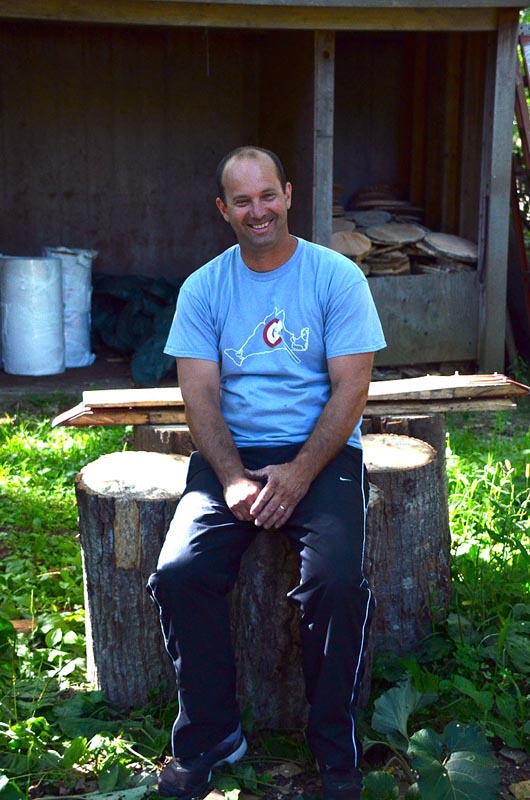Vincent and Heather Maciel could pass for any ordinary married couple. They were high school sweethearts, raised two kids and currently run a tree service and landscaping company in West Tisbury.
But the Maciels are no ordinary couple. The Maciels are lumberjacks.
“I’m a lumberjack, she’s a lumberjill,” Mr. Maciel corrected. He stood outside his home tossing a frisbee — actually a two-inch thick slice of wood — to his dog.
The Maciel family backyard is filled with mountains of wood chips and piles of logs, many of which are longer than a pick-up truck. There are also several chopped up tree trunks in a corner of the yard — a visual cue to any woodsman that a competition is near.
On Saturday, beginning at 11 a.m., the Maciels will head to the annual Agricultural Fair to cut, chain saw and chop their way through the 38th annual woodsmen competition. This is the sixth year Mr. Maciel will compete in the games. Mrs. Maciel started competing four years ago.
Woodsman competitions are a storied tradition turned collegiate sport that in North America dates back to the 1920s.
“Lumberjack sports are what old timers do in the woods,” said Mrs. Maciel. “We use all the same tools they used in the olden days.”
The only change in equipment has been the modification of chain saws, Mr. Maciel said, to make them safer for athletes to handle.
As a lumberjack or lumberjill, one can compete in a variety of different mediums, including axe throwing, wood splitting, sawing, chopping, pole climbing, log rolling and decking.
“We’re always trying to build an audience, because if we don’t have one, the sport could die,” said Mr. Maciel.
It’s a sport that continues to grow in countries like Canada and Switzerland, but not as much in the United States. But the Maciels are trying to change that. Last year, they were part of a group that founded the New England Lumberjack Association. Mr. Maciel is the vice president and Ms. Maciel is the secretary. The group’s mission is to have four competitions a year that they all compete in, one of which is at the Martha’s Vineyard Agricultural Fair.
And while they are hopeful for the future of lumberjack sports, they acknowledge that there are valid reasons why a lot of people don’t get involved. For one, it’s a pricey activity.
“Axes are expensive,” said Mr. Maciel. A good one can run anywhere from $500 up to $7,000. Axes are also not something athletes are able to insure, he said. On top of that, “you have to have an ‘in’ to get equipment because a lot of competitors are the people who make the equipment or reshape it,” Mr. Maciel said.
The Maciels compete in contests all over the country. In 2011, they set a personal driving record, putting 40,000 miles on their Chevy Tahoe pickup truck.
A lumberjack or lumberjill is not in it for the money. On the Vineyard, the most a first place winner can garner is $100 cash.
Not surprisingly, the sport can sometimes be male dominated. Elsewhere, Mr. Maciel said, it can be “hard in the fair world in terms of issues like gender equality. Some fairs are still run by . . . How do I say this? Run by old farmers. People who think women shouldn’t be as involved as men.”
The Vineyard, however, is not stuck in the past. Out of the 40-plus competitors signed up to compete on Saturday, 11 of them are women. An impressive number, Mr. Maciel said.
There is also more room now for older competitors. Within the last five years, the Maciels helped add a masters division, which removed an age cap from the events.
“Masters is for people anywhere from 55 to as long as you can live,” Mr. Maciel said. This year the oldest competitor is 81. But most of the strongest competitors are in their 20s, he added.
Education is a bonus. “We learn a lot about trees,” Mr. Maciel said. “Wood changes everywhere you go. Here on the Island there’s a big white pine harvest. We get the chopping wood for the fair from Massachusetts, sawing wood from Ohio and butcher blocks from New York.”
But the main reason the Maciels continue chopping swift, deft hacks into blocks of wood is passion. For lumberjacks and lumberjills, the sound of an axe striking wood is music to their ears.
“I can see myself doing this for another 10 years at least,” Mrs. Maciel said. “Me too,” said her husband.
“We’ll be doing this for a while,” Mr. Maciel added. "We. . ." he paused then to look at his wife. “We like doing this,” she said. Just like that, she completed his sentence, the way any ordinary married couple would.







Comments (2)
Comments
Comment policy »